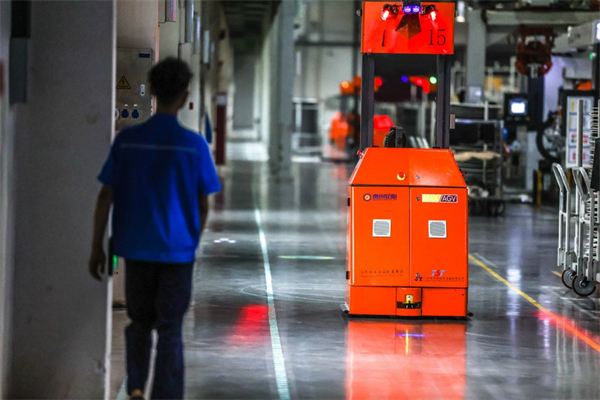
- Home
- Media Center
-
Events
- Wuzhen Summit
- Regional Forums
- Practice Cases of Jointly Building a Community with a Shared Future in Cyberspace
- World Internet Conference Awards for Pioneering Science and Technology
- The Light of Internet Expo
- Straight to Wuzhen Competition
- Global Youth Leadership Program
- WIC Distinguished Contribution Award
- Membership
- Research & Cooperation
- Digital Academy
-
Reports
- Collection of cases on Jointly Building a Community with a Shared Future in Cyberspace
- Collection of Shortlisted Achievements of World Internet Conference Awards for Pioneering Science and Technology
- Reports on Artificial Intelligence
- Reports on Cross—Border E—Commerce
- Reports on Data
- Outcomes of Think Tank Cooperation Program
- Series on Sovereignty in Cyberspace Theory and Practice
- Other Achievements
- About WIC
- 中文 | EN

China's real economy sees new growth engine in digitalization drive

An automatic guided vehicle operates at a fully 5G-equipped workshop, jointly built with China Unicom's Guizhou branch, at the Guizhou Tyre Co Ltd in Guiyang, Southwest China's Guizhou province, May 17, 2022. [Photo/Xinhua]
GUIYANG -- The boom of China's digital technology is becoming a new growth engine of the real economy, injecting impetus to the country's high-quality development.
Digital technology is becoming a leading force of innovation-driven development, said Wang Guangqian, vice chairperson of the 14th Chinese People's Political Consultative Conference National Committee, underlining the deep integration of the digital economy and the real economy.
Wang made the remarks at the opening ceremony of the China International Big Data Industry Expo 2023, running from Friday to Sunday in Guiyang, capital of southwest China's Guizhou Province, with the theme of "integrating digital and real economies, unlocking the future with computing power."
As the country's first national big data comprehensive pilot zone, Guizhou Province has been promoting the big data industry as a backbone of its development, with a number of enterprises riding the waves of digitalization.
Guizhou Tyre Co Ltd, a traditional manufacturing enterprise with a history of over 60 years, established a fully 5G-equipped factory, where over 40 automatic guided vehicles are spotted carrying materials in an orderly manner.
In the factory, manufacturing procedures in different workshops can be checked via computer through real-time data collection, which reduces the cost and improves the quality of products. What's more, the front-line workers do not have to be exposed to dust and pungent smell.
It's one of the first 5G-equipped factories in Guizhou, which means the integration of digital technology and industrial production, said Yu Junfang, vice general manager of China Unicom's Guizhou branch.
Guizhou launched an industrial internet platform in 2017, aiming to promote the use of cloud services among local industrial enterprises and helping them become more digital-savvy.
By May, the number of registered users of the platform exceeded 170,000, making 14,178 main production equipment connected.
After finishing intelligent transformation under the support of the industrial internet platform, Guizhou Yaguang Electronics Technology Co., Ltd. saw the output surge by 58 percent and economic benefits rise by 15 percent.
These figures and cases in Guizhou Province, the country's major big data hub, mirrored China's constant efforts to empower the real economy with digital technology.
China will accelerate the development of the digital economy and further integrate it with the real economy, according to the report to the 20th National Congress of the Communist Party of China.
In the past five years, the digital economy has consistently been mentioned in the Chinese government's annual work reports. During this year's "two sessions," the country unveiled a momentous development that it will set up a national data bureau.
The scale of China's industrial economy is huge, while the country's digital economy ranks second in the world, said Minister of Industry and Information Technology Jin Zhuanglong, adding that the prospect of integrated development between them is broad.
Digital economy should be leveraged as a new driving force of high-quality social and economic development, and integration of real economy and digital technology will also bring opportunities for the emergence of new business forms and models, said Wang.

The World Internet Conference (WIC) was established as an international organization on July 12, 2022, headquartered in Beijing, China. It was jointly initiated by Global System for Mobile Communication Association (GSMA), National Computer Network Emergency Response Technical Team/Coordination Center of China (CNCERT), China Internet Network Information Center (CNNIC), Alibaba Group, Tencent, and Zhijiang Lab.





